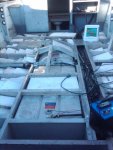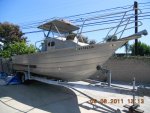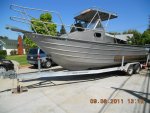Hi guys,
I bought a 26' aluminum boat that I'm planning to fix. Yesterday, I was moving a ladder around in my yard and it touched the boat. Immediately after, one of the 70 gallon aluminum tanks exploded. Thanks God the thing stayed in one piece and nothing came out flying. Nevertheless, it scared the %&^ out of me. It was so loud that even my neighbor came out see what happened. Luckily, the second tank did not explode and aside from the cross members that held the tank in place, everything else seems to be fine. So my questions are, why did this happen? My only assumption is that since the day was dry and windy, there was static and me holding the ladder and touching the boat created a spark in the tank and that was the reason for it to explode. My other question is, how do I prevent it from happening again? I now need to cut the cross members to remove them and replace the tank and do not want the second tank to explode too. Any advice will be greatly appreciated.
BTW, let me know what you think of the boat.
Thanks.
I bought a 26' aluminum boat that I'm planning to fix. Yesterday, I was moving a ladder around in my yard and it touched the boat. Immediately after, one of the 70 gallon aluminum tanks exploded. Thanks God the thing stayed in one piece and nothing came out flying. Nevertheless, it scared the %&^ out of me. It was so loud that even my neighbor came out see what happened. Luckily, the second tank did not explode and aside from the cross members that held the tank in place, everything else seems to be fine. So my questions are, why did this happen? My only assumption is that since the day was dry and windy, there was static and me holding the ladder and touching the boat created a spark in the tank and that was the reason for it to explode. My other question is, how do I prevent it from happening again? I now need to cut the cross members to remove them and replace the tank and do not want the second tank to explode too. Any advice will be greatly appreciated.
BTW, let me know what you think of the boat.
Thanks.























